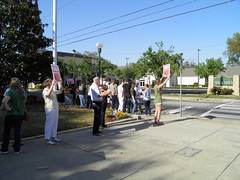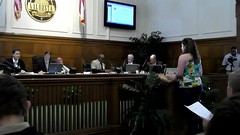 Dr. Serran-Pagan suggests
we have a conversation among all types of people and do the math.
Let’s put the money where it will produce jobs.
Solar, wind, why haven’t we been doing it?
Real clean renewable sources of energy.
He brings up the water the biomass plant would use.
Dr. Serran-Pagan suggests
we have a conversation among all types of people and do the math.
Let’s put the money where it will produce jobs.
Solar, wind, why haven’t we been doing it?
Real clean renewable sources of energy.
He brings up the water the biomass plant would use.
Water is precious. Air is precious. Oil, coal, is not precious. Biomass is not precious. We have plenty of good clean, renewable sources of energy. Let’s do that…. and get rid of old models, and let’s try to do what is right for community, for our economy, and for public interest.
Here’s the video:
Conversation for jobs —Cristobal Serran-Pagan @ VCC 7 April 2011
Regular monthly meeting of the Valdosta City Council (VCC),
Valdosta, Lowndes County, Georgia, 7 April 2011,
Videos by Gretchen Quarterman for LAKE, the Lowndes Area Knowledge Exchange.
-jsq






